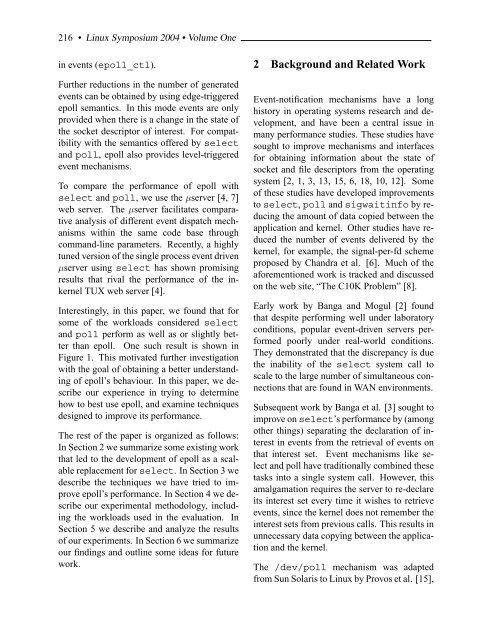Create successful ePaper yourself
Turn your PDF publications into a flip-book with our unique Google optimized e-Paper software.
216 • <strong>Linux</strong> Symposium 2004 • Volume <strong>One</strong><br />
in events (epoll_ctl).<br />
Further reductions in the number of generated<br />
events can be obtained by using edge-triggered<br />
epoll semantics. In this mode events are only<br />
provided when there is a change in the state of<br />
the socket descriptor of interest. For compatibility<br />
with the semantics offered by select<br />
and poll, epoll also provides level-triggered<br />
event mechanisms.<br />
To compare the performance of epoll with<br />
select and poll, we use the µserver [4, 7]<br />
web server. <strong>The</strong> µserver facilitates comparative<br />
analysis of different event dispatch mechanisms<br />
within the same code base through<br />
command-line parameters. Recently, a highly<br />
tuned version of the single process event driven<br />
µserver using select has shown promising<br />
results that rival the performance of the inkernel<br />
TUX web server [4].<br />
Interestingly, in this paper, we found that for<br />
some of the workloads considered select<br />
and poll perform as well as or slightly better<br />
than epoll. <strong>One</strong> such result is shown in<br />
Figure 1. This motivated further investigation<br />
with the goal of obtaining a better understanding<br />
of epoll’s behaviour. In this paper, we describe<br />
our experience in trying to determine<br />
how to best use epoll, and examine techniques<br />
designed to improve its performance.<br />
<strong>The</strong> rest of the paper is organized as follows:<br />
In Section 2 we summarize some existing work<br />
that led to the development of epoll as a scalable<br />
replacement for select. In Section 3 we<br />
describe the techniques we have tried to improve<br />
epoll’s performance. In Section 4 we describe<br />
our experimental methodology, including<br />
the workloads used in the evaluation. In<br />
Section 5 we describe and analyze the results<br />
of our experiments. In Section 6 we summarize<br />
our findings and outline some ideas for future<br />
work.<br />
2 Background and Related Work<br />
Event-notification mechanisms have a long<br />
history in operating systems research and development,<br />
and have been a central issue in<br />
many performance studies. <strong>The</strong>se studies have<br />
sought to improve mechanisms and interfaces<br />
for obtaining information about the state of<br />
socket and file descriptors from the operating<br />
system [2, 1, 3, 13, 15, 6, 18, 10, 12]. Some<br />
of these studies have developed improvements<br />
to select, poll and sigwaitinfo by reducing<br />
the amount of data copied between the<br />
application and kernel. Other studies have reduced<br />
the number of events delivered by the<br />
kernel, for example, the signal-per-fd scheme<br />
proposed by Chandra et al. [6]. Much of the<br />
aforementioned work is tracked and discussed<br />
on the web site, “<strong>The</strong> C10K Problem” [8].<br />
Early work by Banga and Mogul [2] found<br />
that despite performing well under laboratory<br />
conditions, popular event-driven servers performed<br />
poorly under real-world conditions.<br />
<strong>The</strong>y demonstrated that the discrepancy is due<br />
the inability of the select system call to<br />
scale to the large number of simultaneous connections<br />
that are found in WAN environments.<br />
Subsequent work by Banga et al. [3] sought to<br />
improve on select’s performance by (among<br />
other things) separating the declaration of interest<br />
in events from the retrieval of events on<br />
that interest set. Event mechanisms like select<br />
and poll have traditionally combined these<br />
tasks into a single system call. However, this<br />
amalgamation requires the server to re-declare<br />
its interest set every time it wishes to retrieve<br />
events, since the kernel does not remember the<br />
interest sets from previous calls. This results in<br />
unnecessary data copying between the application<br />
and the kernel.<br />
<strong>The</strong> /dev/poll mechanism was adapted<br />
from Sun Solaris to <strong>Linux</strong> by Provos et al. [15],

















